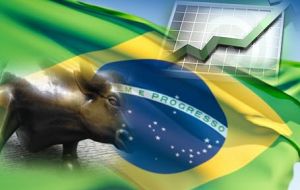MercoPress. South Atlantic News Agency
Brazil’s development bank lends 30bn dollars at subsidized rate in five months
 Infrastructure and industry, the most benefited with the soft loans
Infrastructure and industry, the most benefited with the soft loans Lending by Brazil’s BNDES (National economic and social development bank) totalled 43.5 billion Real (29bn dollars approx) in the first five months of the year, representing a contraction of 6% compared to the same period in 2010, according to a bank’ release.
The bank points out that the loans privileged small and medium sized enterprises, having taken 44% of funds. In the first five months of the year the bank completed 290.000 credit operations of which 94% involving small and medium sized companies.
Small companies working with the BNDES card in the first five months received loans equivalent to 2.4bn Real and in the twelve months to May, 5.3bn Real.
The evolution of operations in the first five months of this year indicates, according to the bank, that total loans in the twelve months will reach in the range of 145 billion Real, which is similar to the 2010 figure.
Infrastructure was awarded 17.5bn Real in loans (40% of the total for May) with highway transport taking the highest share, 10.5bn Real.
Industry follows with 13.7bn Real (32%) with food and beverage, 3bn, transport material, 2.2bn, and chemistry and petrochemical, 2bn.
Finally for agriculture BNDES extended 3.6bn in loans (8% of total) and Retailing and services, 8.5bn (20%).
Regarding the last twelve months to May, BNDES extended 140.9bn Real in loans without taking into account the capitalization of Petrobrás in September last year with 24.7bn and other operations in the secondary market, which is 7% below the previous 12 months.
However taking into account Petrobras operations total loans reached 165.8bn Real in the last 12 months, up 10% over the previous similar period.
BNDES has been criticized from outside the government for an enormous increase in subsidized lending in recent years, which economists say contributes to inflation and undermines the impact of the central bank's interest rate increases.
BNDES loans are offered at lower interest rates than those of private banks. They are calculated in accordance with the government's long-term interest rate, known as the TJLP, which is 6%, plus an average spread of 2%. Commercial loans typically come at a spread over the benchmark Selic base rate, which is 12.5%.
The central bank has raised the Selic five times so far this year in an effort to contain domestic demand and rein in credit, with an eye toward making inflation, currently above 6%, converge toward the 4.5% target sometime in 2012.




Top Comments
Disclaimer & comment rules-

Read all commentsSo,
Jul 28th, 2011 - 10:55 am 0$Real 165 b disbursed in the 12 months in total,
$Real 5 b disbursed in the 12 months to SMEs.
That makes
$Real 160 b disbursed in the 12 months to the big boys. 92%.
If the REAL development of a country is measured in the SMEs becoming big boys, how come only some 8% of Brasil's development funds (BNDES) is going to the SMEs?
Why the imperative to give HUGE taxpayer monies ( eg. $Real160 billion) to the already rich and big?
Could it be that skimming is easier?
Could it be that this money can be re-cycled and returned as into 'political money' more easily?
Answers are hard to come by.
Commenting for this story is now closed.
If you have a Facebook account, become a fan and comment on our Facebook Page!